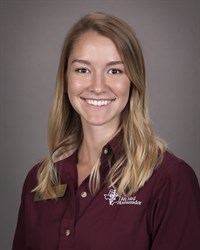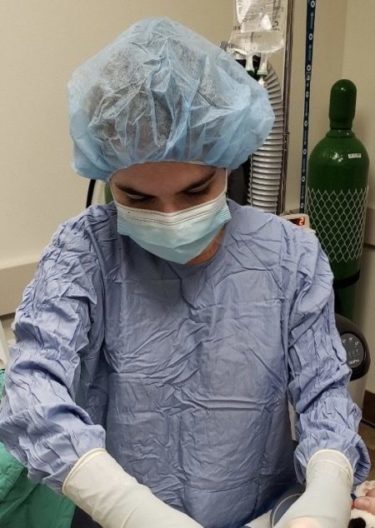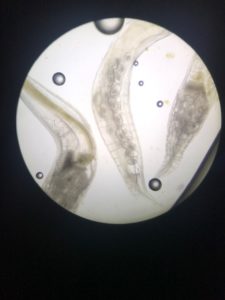 We are now over a quarter of the way done with the semester! Whoop! Veterinary School is really good at keeping our minds and bodies busy, so even though it feels like the clock is barely ticking during some class days, it’s actually FLYING by! I can feel the jittery excitement in the air, because all of my third-year classmates can finally see a glimmer of light at the end of the vet school tunnel. We are gaining confidence, skills, and wisdom; we finally feel closer to being doctors and further from students.
We are now over a quarter of the way done with the semester! Whoop! Veterinary School is really good at keeping our minds and bodies busy, so even though it feels like the clock is barely ticking during some class days, it’s actually FLYING by! I can feel the jittery excitement in the air, because all of my third-year classmates can finally see a glimmer of light at the end of the vet school tunnel. We are gaining confidence, skills, and wisdom; we finally feel closer to being doctors and further from students.
We third-year students have gotten more comfortable with basic surgical procedures so far this semester; nevertheless, I still sweat bullets the entire time. Putting non-powdered surgical gloves onto sweaty hands should be an Olympic sport. Gold medal goes to me for my hilarious and laborious struggle with such a menial task! This week, AFTER I took 10 minutes to get my gloves on, I proceeded to accidentally poke a hole in the glove on my left index finger with a stray towel clamp, which meant I had to stop what I was doing, remove my poked glove, and start the whole gloving process over again. It’s definitely a learning curve.
Luckily for me, sweating doesn’t interfere with my paper test-taking skills! 3VM students had a BIG Small Animal Medicine test this week covering a month and a half of oncology and endocrinology material. These are probably some of the most common diseases I will be dealing with as a small-animal veterinarian once I graduate. Unfortunately, at least 50 percent of dogs over the age of 10 will get some form of cancer, which is why it is so important for us to learn how to treat and manage cancer patients. It may be surprising to you, but dogs and cats are candidates for chemotherapies and radiation, just like humans! Our professor, Dr. Claudia Barton, made sure to emphasize the fact that cancer is indiscriminate of species; therefore, observations from cancer in our domestic animals can be studied and incorporated into human oncologic research.
For endocrinology, we are taught by Dr. Audrey Cook, who has a wonderful European accent and a remarkable passion for the diseases she presents. I actually printed out all of her notes, put it in a binder, and labeled it my “Cook Book,” since I plan on keeping it on my shelf in my veterinary practice in the near future. My favorite disease she has talked about is feline hyperthyroidism. I like it because it is a disease that likes to hide behind the façade of just “old cat syndrome,” but when correctly diagnosed and treated it can really improve the lives of our aging kitties. It is nerve-wracking to learn all of these common, everyday diseases while having aging animals of your own. I find myself wondering which diseases my own cat will get someday—and hoping I will be sharp enough to spot them early and treat them!
This upcoming Monday is one of the few Mondays that we don’t have an exam. To take advantage of my lessened weekend stressors, I am headed back to my hometown of Boerne to visit my parents, my 103-year-old great-uncle, and my three brothers. I haven’t seen any of them since summer and am starting to feel the homesickness. I try to make time during the week to reach out to all of them, but sometimes it just doesn’t happen with everything else going on. Hopefully they can get my head out of my textbooks, help me to relax, and have a little fun before diving back on Monday.
What I have found to be so incredible and different about our third year of vet school is that we are finally putting all the pieces together and understanding veterinary medicine on a different level. Our veterinary puzzle is actually starting to come together, and it is SO EXCITING!
 This summer, I was lucky enough to be selected to participate in Banfield Pet Hospital’s Summer Job Program. Back in March, I was assigned to work at a clinic in Houston. The program is designed to be a mix of working as a technician and learning alongside the doctors. While I was initially concerned that the experience would be canceled due to COVID-19, everything continued as planned!
This summer, I was lucky enough to be selected to participate in Banfield Pet Hospital’s Summer Job Program. Back in March, I was assigned to work at a clinic in Houston. The program is designed to be a mix of working as a technician and learning alongside the doctors. While I was initially concerned that the experience would be canceled due to COVID-19, everything continued as planned! Not only did I perform routine physical exams, but I also got to do orthopedic and neurologic exams. I also became much more confident in interpreting diagnostic tests like fecal exams and ear cytologies. I even got to scrub in on surgeries!
Not only did I perform routine physical exams, but I also got to do orthopedic and neurologic exams. I also became much more confident in interpreting diagnostic tests like fecal exams and ear cytologies. I even got to scrub in on surgeries!
 We are now over a quarter of the way done with the semester! Whoop! Veterinary School is really good at keeping our minds and bodies busy, so even though it feels like the clock is barely ticking during some class days, it’s actually FLYING by! I can feel the jittery excitement in the air, because all of my third-year classmates can finally see a glimmer of light at the end of the vet school tunnel. We are gaining confidence, skills, and wisdom; we finally feel closer to being doctors and further from students.
We are now over a quarter of the way done with the semester! Whoop! Veterinary School is really good at keeping our minds and bodies busy, so even though it feels like the clock is barely ticking during some class days, it’s actually FLYING by! I can feel the jittery excitement in the air, because all of my third-year classmates can finally see a glimmer of light at the end of the vet school tunnel. We are gaining confidence, skills, and wisdom; we finally feel closer to being doctors and further from students.